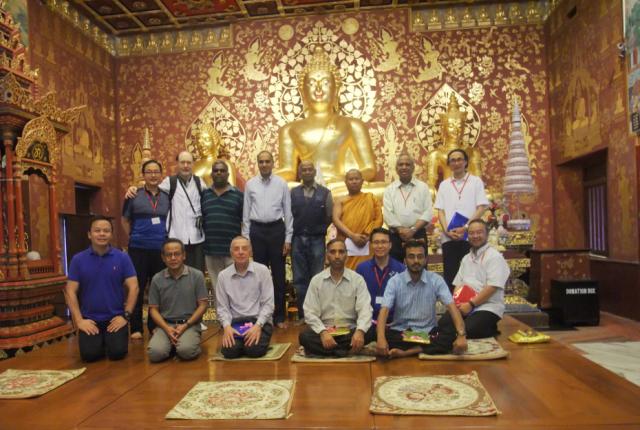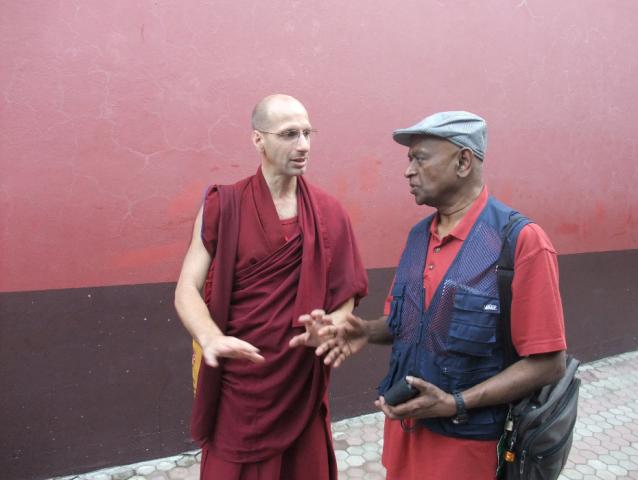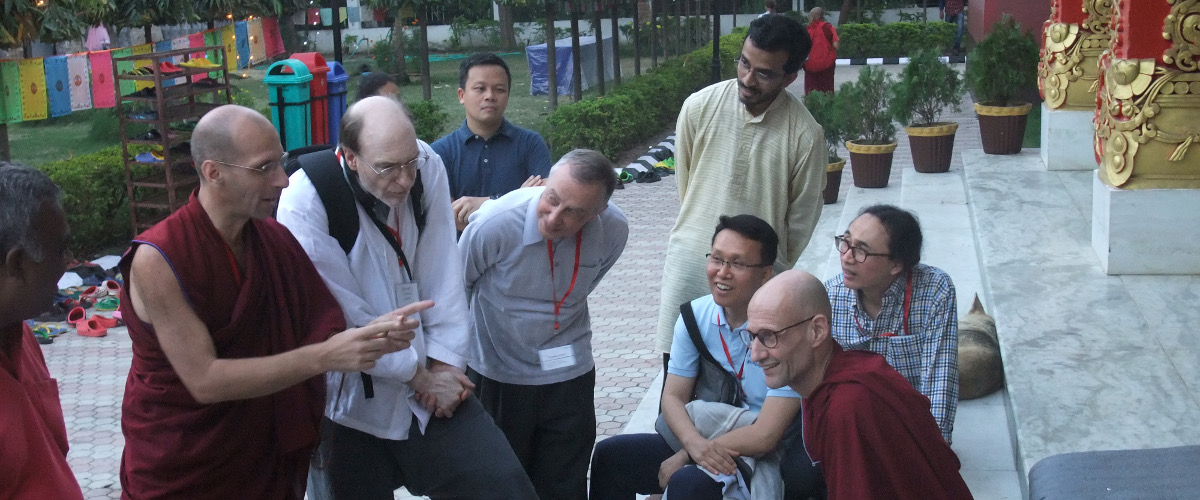Jesuits and Buddhist monks and nuns came together in early March to share and dialogue on ecology and religions in a workshop organised by the Jesuit Conference of Asia Pacific.
Organised locally by Fr Lawrence Soosai SJ of the Patna Jesuit Province, the three-day workshop was held in India, in the city of Bodhgaya where the Buddha is believed to have attained enlightenment, and which is one of the holiest of Buddhist cities.
Fourteen Jesuits participated – four from India, three from Japan, two from Korea, two from Indonesia, one from Taiwan, one from the Philippines, and a Vietnamese from the USA – along with several Buddhist monks and nuns from monasteries in Bodhgaya.
 The sessions in the first morning began with scripture chanting by monks of both Mahayana and Hinayana persuasions, before Fr Jose Vadaserry, the Jesuit Provincial of Patna, formally released the first book published by the Jesuit Conference on Buddhist-Christian dialogue. Entitled The Buddha and Jesus, the book is a collection of 16 essays that discusses Buddhist traditions, inculturation, meditation methods, issues in Chinese Buddhism, doctrinal interpretations in early Buddhism, the spirituality of indigenous peoples, and more.
The sessions in the first morning began with scripture chanting by monks of both Mahayana and Hinayana persuasions, before Fr Jose Vadaserry, the Jesuit Provincial of Patna, formally released the first book published by the Jesuit Conference on Buddhist-Christian dialogue. Entitled The Buddha and Jesus, the book is a collection of 16 essays that discusses Buddhist traditions, inculturation, meditation methods, issues in Chinese Buddhism, doctrinal interpretations in early Buddhism, the spirituality of indigenous peoples, and more.
After listening to the discourse of an eminent Thai monk, the Venerable Ratna Thero, the group proceeded to the Root Institute, a meditation centre run by Mahayana monks. There, Indian Jesuit historian Fr Jose Kalapura presented some thought-provoking insights on Christianity and ecology. “Gone are the days of individual salvation. One can no longer today attain salvation without the community and the entire creation, that is why we need to mend our ways and heal the wounded planet,” he said.
The rest of the programme included talks, discussions and lively exchanges by Jesuits and invited guests such as monks of diverse nationalities and sects, who shared their views on life and spirituality. One of these was a discourse by a Mahayana monk, Ven. Kabir Saxena, who declared that we have still not discovered nature and creation. In this context he said, “We have become self-forgetful, imitative and artificial. The call is to become original and thus restore the true creation.”
The workshop concluded on March 6 with a visit to the remains of Nalanda University, alma mater to numerous eminent Buddhist scholars of the past.
“We experienced a real thrill at the thought of strolling along corridors that bore the footprints of men like the Chinese Xuanzang and the Indian Aryadeva, of the 7th Century,” said Fr Cyril Veliath SJ, JCAP Coordinator for Dialogue with Buddhism.
 For many of the participants, this sixth international workshop organised by the Jesuit Conference of Asia Pacific on Buddhist Christian Dialogue, was a particularly enriching experience.
For many of the participants, this sixth international workshop organised by the Jesuit Conference of Asia Pacific on Buddhist Christian Dialogue, was a particularly enriching experience.
“Compared to earlier workshops Bodhgaya was unique in being marked by a deeper spirit of dialogue, with monks, nuns, and lay people,” said Fr Veliath.
For Fr Mathew Cyril SJ, the personal sharing of the Ven. Buddhist monks, Ven. Tenzin and our fellow Jesuits was the highlight of the workshop. “It really put us in deep bond with one another and I really felt that we are all co-pilgrims and co-seekers. And we need this inter-personal sharing, support and understanding.”
Related story: Encouraging Buddhist-Christian dialogue


